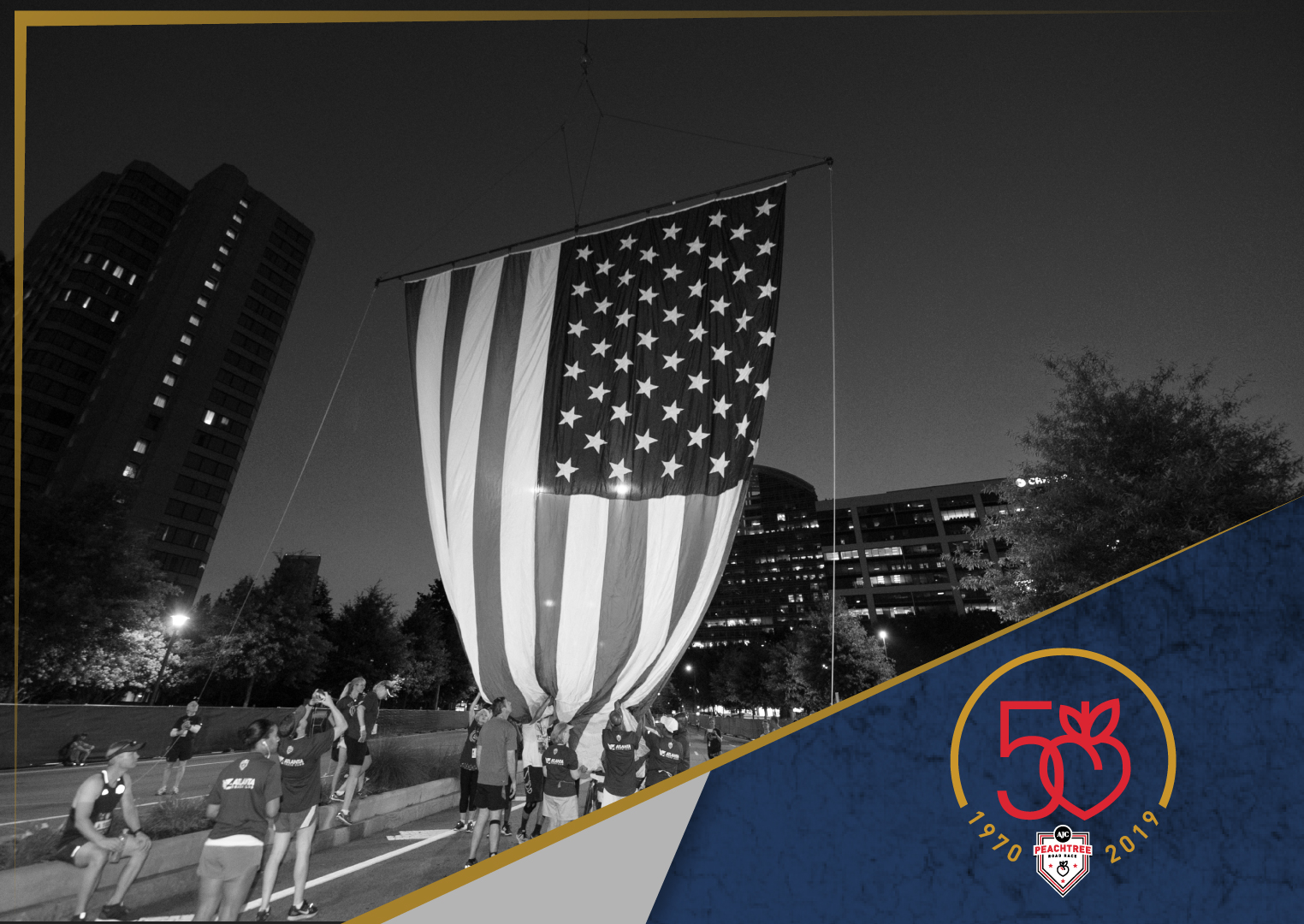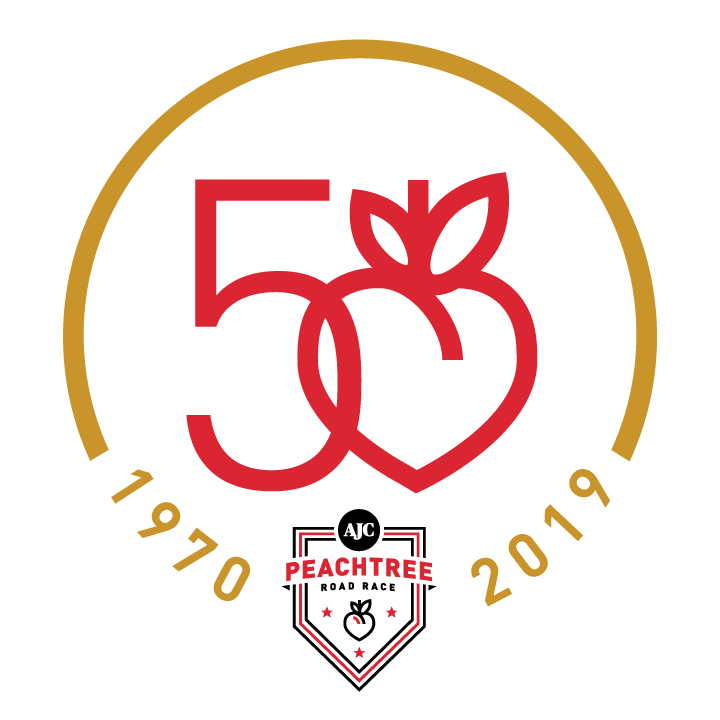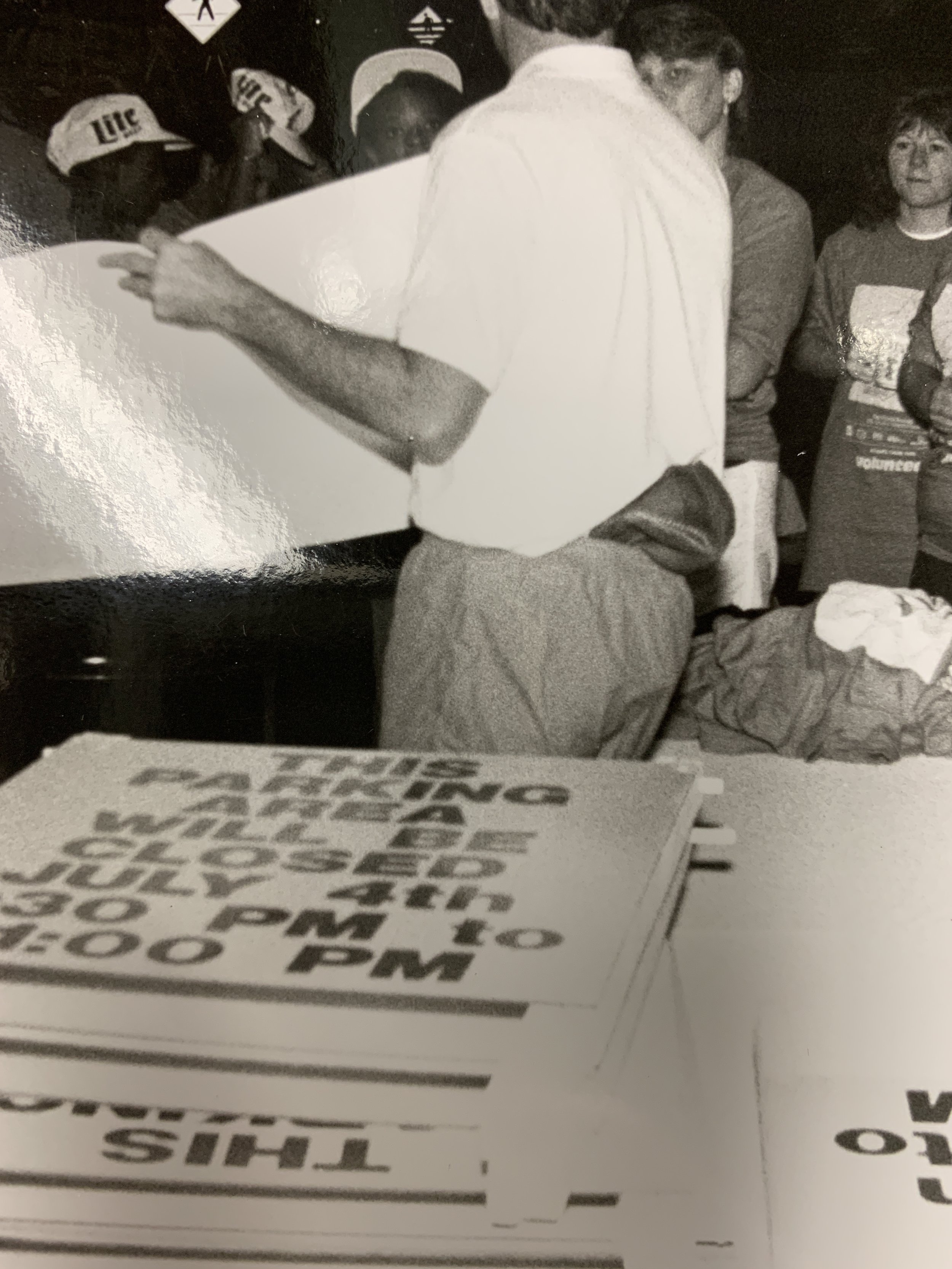The Volunteers Did That?

The AJC Peachtree Road Race has existed for 50 years because of the hard work and dedication of many thousands of volunteers. Because of them, the race has grown from 110 finishers served by 12 volunteers to 60,000 runners overseen by 3,500. Over the years, they have performed some jobs you may never have noticed or expected a volunteer to perform. Together, they have left an indelible mark on the world’s largest 10K. In this week’s edition, we take a look at five of the more surprising jobs that they’ve been charged with.
5. Flag Finder
About 20 years ago, volunteer AJC Peachtree Road Race course director Jack Abbott was running the Falmouth Road Race, in Massachusetts. As he rounded the last corner and headed downhill to the finish, he saw a giant, 45-by-90-foot American flag, suspended from a crane, flying over the runners as they came in. “Hmmm,” jokes Abbott. “I thought ‘Big flag … Fourth of July … Peachtree Road Race … We need to do this!”
Abbott tracked down the owner of the flag and arranged to have it driven to Atlanta for the Peachtree in 2000. It was a hit, but the transport proved too expensive so the next year he tracked down a 30-by-60-foot flag owned by the City of Roswell. They generously loaned their flag to the race for several years.
In 2004, Abbott handed the flag responsibilities to Bill Nemeth, who was then the start director. Atlanta Track Club soon bought its own 30-by-60-foot flag, which could be raised on a standard of Nemeth’s design. Nemeth continued “ownership” of the flag until he retired as start director in 2009.
The saga continued as Jim Staskiewicz, one of Bill Nemeth’s neighbors, took over flag duties once Nemeth stepped aside. Staskiewicz spent many years helping Bill raise the flag; now Bill helps Jim raise the flag. There often seems to be a connection when it comes to Peachtree volunteers.
It takes Jim, Bill and 15 other volunteers to prep and carry the flag before it can be raised on race morning.
4. Water Stops for Your Practice Run
Most people realize and appreciate that the hydration stations for the AJC Peachtree Road Race, with 60,000 runners, are huge, frequent and provide plenty of water to the runners on what is usually a hot and muggy day.
Each year, perhaps because of the excitement of the approaching race, many people do “practice” runs on the course. From early June until the eve of the race, people spend their weekend mornings running the Peachtree course. The numbers increase each week. Roughly 30 years ago, Atlanta Track Club began setting up a hydration station to serve these runners. For many years, a small shed full of materials was staged in a parking lot along the third mile of the course. Volunteers would come on Saturday and Sunday mornings, fill up water coolers and pour cups for the thirsty runners.
The current volunteer crew chief is Dennis Burgess. It was determined, correctly, that the shed staging method was not working. It was too difficult to control. Water coolers had to be filled and lugged up to the street. People would break into the shed hoping to find something of value, probably disappointed when they found a folding table and a box of cups.
Burgess has made the job his own by coming to Atlanta Track Club’s office each week, where he fills the bed of his truck with bottles of water and other materials. When he reaches the site, other volunteers join him to help set up and hand out water.
3. Sign of the Times
In 2019, you can’t sling a sheet of chloroplast without hitting a sign store, but 50 years ago this wasn’t the case. Almost every sign Atlanta Track Club used from its inception until the early 2000s was hand-painted. For the AJC Peachtree Road Race, this was a huge job. As the race grew, the need for signs grew.
The dawn of the start corrals signaled the need for dozens of new directional signs for each Peachtree, to lead the runners from parking lots or MARTA stations to their respective start corrals. The signs could not be used over again because the numbers of runners kept rising and the numbers of corrals increased. Even the route that runners took from MARTA could change. New signs were needed every year, and someone had to produce them.
That someone was longtime Atlanta Track Club volunteer Katy Bryant. The AJC Peachtree Road Race Committee would meet, come up with a long list of signs, then get that list to Bryant. Due to the complexity of the job, Bryant soon joined the Committee herself.
Most of the signs consisted of a range of bib numbers (“Runner Number 1200-1500”) followed by an arrow. Some seemed simple (“1 Bottle of Water Per Runner), but 10 of them were needed and they were huge. Many of the signs Bryant created were 4-by-6-foot or larger. Very tedious. Very difficult. Bryant would spend hundreds of hours each year producing the signs. She would do this with great care, always wanting them to be perfect. And they always were.
The burden on her time became so great that occasionally signs had to be delivered race morning with the paint still wet. It was a different time.
2. A Human Database
In 1990, the number of runners in the AJC Peachtree Road Race increased from 25,000 to 40,000. For race day, each of the runners needed to be on a list with their assigned number and any relevant medical information. These lists had to be given to each of the two medical tents, in case of emergency, and to the results tent. There was no “Windows Office 1990” or email. Hard copies had to be made of everything. Four copies of a list of 40,000 names (increasing to 50,000 by 1995) had to be printed on a dot-matrix printer donated to the club by Christopher Columbus. This couldn’t be done until the evening of July 3, so that any changes to the list could be made before printing.
Joyce Hoobler was the office manager at the time. “Every participant had to be on the list, there were no portable computers at the time. It would literally take hours to print.”
Once printed, Hoobler and a volunteer would have to decollate the copy into four separate lists to have them ready for the medical team in the morning. Often it would be 11 p.m. before she would finish. She had to be on site at the park by 4 a.m. the next day.
1. Making Sure Joe Smith is Really Joe Smith
Data entry and verification are part of any road race, but the size and scope of the AJC Peachtree Road Race make it a unique job here. At the time the AJC Peachtree Road Race nearly doubled in size, all entry and verification was still done by hand.
Katherine Welden was one of the volunteer crew chiefs handling this job. All entries for the race were on paper applications, which had to be entered into the computer by volunteers. Atlanta Track Club had a limited number of computers at the time. Katherine and a few other crew chiefs, leading a group of volunteers, would come into the office after hours to use the computers for data entry. For over a month, she and her volunteers would enter the data in the computers between 6 p.m. and 11 p.m.
An even-tougher job was verifying that the times submitted were correct and that the person listed on the application was the same person who was going to run the race. At the time, it was so difficult to get in the race that people would send in numerous applications under different names, to gain a greater chance of getting in. People also tried to get multiple numbers so they could sell them. As the usually softspoken Welden says, “They would lie! lie! lie! to get that number. A law firm near where Atlanta Track Club once stood) sent in the names of their interns.” Welden said she and the volunteers would have a contest for the craziest made-up name. She refused to mention any of the entrants.
Katherine Welden has been a volunteer for Atlanta Track Club for more than 40 years. She has seen a lot change in her time with the club. Until recently, she would volunteer for almost all of the Club’s events. She’s in her 80s now and finds she’s too busy to work as many events. Katherine has run 39 AJC Peachtree Road Races.








